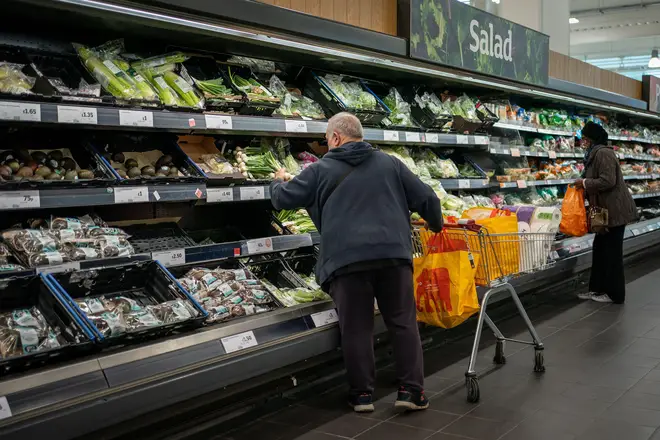
Iain Dale 7pm - 10pm
20 July 2022, 07:14 | Updated: 20 July 2022, 08:33

UK inflation has surged to a fresh 40-year high as fuel and energy prices rocketed amid the cost-of-living squeeze, according to official figures.
The Office for National Statistics (ONS) said Consumer Prices Index (CPI) inflation rose to 9.4% in June, up from 9.1% in May.
This remains the highest level since February 1982 and heaps yet further cost pain on cash-strapped households and businesses.
Chief Secretary to the Treasury Simon Clarke told LBC’s Nick Ferrari at breakfast this morning: “We have to address the challenge of inflation. If we don’t get it under control it will undermine living standards.
“The drivers of this inflation are predominantly external. We will do our utmost to bring this situation under control as quickly as possible.”

Treasury Minister reacts to inflation soaring to 40-year high
Food and non-alcoholic drinks rose by 9.8% in the year to June, the highest rate since March 2009. Milk, cheese and eggs as well as vegetables, meat and other food products such as ready meals became more expensive.
Grant Fitzner, chief economist at the Office for National Statistics (ONS), said: "Annual inflation again rose to stand at its highest rate for over 40 years.
"The increase was driven by rising fuel and food prices, these were only slightly offset by falling second-hand car prices.
"The cost of both raw materials and goods leaving factories continued to rise, driven by higher metal and food prices respectively.
"These increases saw raw materials post their highest annual increase on record, with manufactured goods at a 45-year high."
Read more: Trail of evacuations and devastation follow heatwave as forecasters warn of thunderstorms
Rising prices for motor fuels and food were the biggest contributors to the increased inflation rate, according to the data.
Average petrol prices rose by 18.1p per litre in June, the largest monthly rise on record, since 1990.
Meanwhile, the average price of diesel rose by 12.7p per litre.
Chancellor Nadhim Zahawi said: "Countries around the world are battling higher prices and I know how difficult that is for people right here in the UK, so we are working alongside the Bank of England to bear down on inflation.
"We've introduced £37 billion worth of help for households, including at least £1,200 for eight million of the most vulnerable families and lifting over two million more of the lowest paid out of paying personal tax."
Read more: 'I just hope our house is still there': Devastating fires break out as UK endures 40C heat
Read more: Met Office warns of 40C heatwave every three years after UK burns in 40C heat
What does inflation mean?
Inflation represents the rate at which goods and services increase in price over a period of time. Therefore, if the general prices of items in an economy go up, that amounts to inflation.
It is crucial for measuring a country's economic wellbeing as it affects how much people can buy with the money they earn. If goods and services generally cost more, one cannot purchase as much.
The national rate of inflation is expressed as a percentage, as is inflation on every day items. For example, if the rate of inflation for UK houses is at 3% a year, then buyers must spend 3% more on a new home than they would have done 12 months earlier.
If people's wages and salaries increase at the same rate of inflation, then they should still be able to purchase the same goods and services year-on-year. But, if wage increases fall below the rate of inflation, that person's purchasing power and standard of living will fall.
Some inflation is healthy as it encourages the consumer to make purchases sooner rather than later, which helps businesses increase wages which, in turn, can boost the economy - this is why most central banks have a target of 2-2.5%.

'If he increases taxes we're out of business!'
Anna Leach, deputy chief economist at the Confederation of British Industry warned inflation was likely to remain high for the rest of the year "severely eating into strained household incomes".
She said: "This data underscores the need to give people more control over their energy bills: through speeding up planning decisions for electricity infrastructure and creating a national effort to help households better insulate their homes.
"But to build resilience to price shocks over the longer-term, the Government needs to focus on boosting the economy's supply potential.
"Incentivising investment through a permanent successor to the super deduction and supporting the development of green infrastructure are crucial first steps."
How is inflation measured?
The ONS measures inflation - which is not a precise science - by giving three main estimates:
• The CPI
• The Consumer Prices Index including owner-occupiers' housing costs (CPIH)
• The Retail Price Index (RPI)
The CPI is the figure most commonly used to measure inflation as it analyses the cost of thousands of products people often spend their money on, such as food, phones, and clothes.
Items that are more commonly bought, such as fuel and food, can have a greater impact on the CPI than items such as toothbrushes or lightbulbs.
However, the ONS often looks at the CPIH as it includes other costs associated with living in a house or flat, such as council tax.